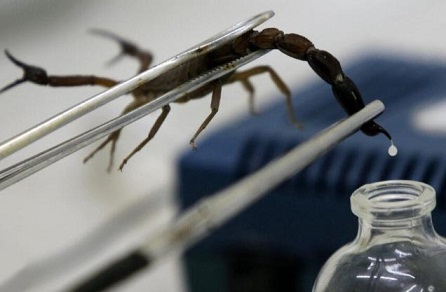Thailand medical researchers discover peptide from Scorpion venom to treat drug resistant Pseudomonas biofilm infections
Nikhil Prasad Fact checked by:Thailand Medical News Team Aug 22, 2024 1 year, 6 months, 1 day, 8 hours, 35 minutes ago
Thailand Medical: In an exciting development, medical researchers from Thailand have discovered a novel therapeutic agent derived from scorpion venom that could revolutionize the treatment of stubborn biofilm infections caused by the bacterium Pseudomonas aeruginosa. This groundbreaking research, which has captured the attention of the global medical community, highlights the potential of a truncated peptide, IsCT-∆6-8, in combating these persistent and often resistant infections.
 Thailand medical researchers discover peptide from Scorpion venom to treat
Thailand medical researchers discover peptide from Scorpion venom to treat
drug resistant Pseudomonas biofilm infections
A Persistent Threat: Understanding Pseudomonas aeruginosa Biofilms
Pseudomonas aeruginosa is a notorious pathogen known for its ability to cause severe infections, particularly in individuals with compromised immune systems. The bacterium is a common cause of hospital-acquired infections, thriving in environments where antibiotic resistance is prevalent. What makes P. aeruginosa particularly challenging to treat is its capacity to form biofilms - protective layers that shield the bacterial colonies from antibiotics and the immune system.
These biofilms are responsible for the chronic nature of P. aeruginosa infections, leading to prolonged hospital stays and increased mortality rates. The urgency to find effective treatments for these biofilm-associated infections has been emphasized by the World Health Organization, which lists P. aeruginosa as a critical priority pathogen for new antibiotic development.
The Scorpion Venom Connection: A Promising Discovery
The study, conducted by researchers from the Department of Microbiology and Parasitology at Naresuan University, Phitsanulok-Thailand and the Functional Proteomics Technology Laboratory at the National Center for Genetic Engineering and Biotechnology that is part of the National Science and Technology Development Agency in Thailand, focused on a peptide derived from the venom of the scorpion Opisthacanthus madagascariensis. This peptide, known as IsCT, has been previously recognized for its potent antimicrobial properties. However, its use has been limited due to its toxicity to mammalian cells.
In an effort to harness the therapeutic potential of IsCT while minimizing its harmful effects, the researchers synthesized several truncated analogs of the peptide. Among these, IsCT-∆6-8 emerged as the most promising candidate, demonstrating significant anti-biofilm and anti-inflammatory properties without the associated cytotoxicity. This
Thailand Medical news report will explore how this discovery could pave the way for new treatments against P. aeruginosa biofilm infections.
Key Findings: Anti-Biofilm and Anti-Inflammatory Effects
The researchers employed a series of tests to evaluate the efficacy of the IsCT-∆6-8 peptide against P. aeruginosa biofilms. One of the most notable findings was that the peptide reduced biofilm biomass by 33.12%, a significant decrease that suggests its potential as a therapeutic agent
. Importantly, this reduction was not linked to bacterial growth inhibition, which means that the peptide works by disrupting the biofilm structure rather than merely killing the bacteria. This is a crucial distinction, as growth inhibition often leads to the development of antibiotic resistance.
In addition to its anti-biofilm properties, IsCT-∆6-8 also inhibited the production of pyocyanin, a virulence factor produced by P. aeruginosa that plays a critical role in biofilm formation and infection severity. Pyocyanin is known for its ability to generate reactive oxygen species, leading to cell damage and facilitating the establishment of chronic infections. The peptide's ability to suppress pyocyanin production further underscores its potential as a therapeutic tool.
Another critical aspect of the study was the investigation into the peptide's anti-inflammatory effects. The researchers found that IsCT-∆6-8 significantly reduced the production of nitric oxide (NO) and interleukin-6 (IL-6), two key inflammatory mediators, in macrophages stimulated by P. aeruginosa lipopolysaccharides (LPS). Excessive production of these mediators is associated with severe tissue damage and impaired lung function in infections caused by P. aeruginosa. By reducing the levels of NO and IL-6, the peptide may help mitigate the inflammatory response, offering a dual approach to treating these infections: both combating the biofilm and alleviating the inflammation that exacerbates the disease.
Implications for the Future: A New Hope for Treatment
The discovery of IsCT-∆6-8 is a significant step forward in the fight against Pseudomonas aeruginosa biofilm infections. The peptide's dual action - disrupting biofilms and reducing inflammation - makes it a particularly attractive candidate for further development. The low cytotoxicity observed in the study suggests that IsCT-∆6-8 could be used in clinical settings without the severe side effects that often accompany other antimicrobial peptides.
Moreover, the findings open up new avenues for research into the mechanisms by which the peptide exerts its effects. Understanding these mechanisms could lead to the development of even more effective analogs or combinations of treatments that could further improve patient outcomes.
Conclusion: A Promising Path Forward
The
Thailand medical researchers' discovery of the IsCT-∆6-8 peptide marks a promising development in the ongoing battle against antibiotic-resistant infections. With its potent anti-biofilm and anti-inflammatory properties, this peptide could become a cornerstone in the treatment of stubborn Pseudomonas aeruginosa infections that have long plagued the medical community.
The study findings were published in the peer-reviewed journal: Antibiotics.
https://www.mdpi.com/2079-6382/13/8/775
For the latest research on drug-resistant bacterial and fungal pathogens, keep on logging
to Thailand Medical News.
Read Also:
https://www.thailandmedical.news/news/thailand-medical-scientists-discover-that-extracts-of-vernonia-amygdalina-can-induce-apoptosis-in-certain-cancer-cell-lines
https://www.thailandmedical.news/news/thailand-medical-researchers-leverage-3d-printing-to-produce-tablets-containing-mucuna-extract-to-treat-erectile-dysfunction
